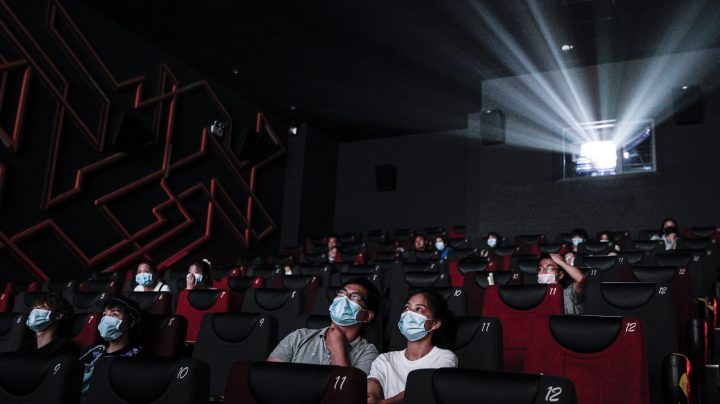
Streaming has its own allure, but movie theaters still offer “a little bit of joy”
Streaming has its own allure, but movie theaters still offer “a little bit of joy”

“Avatar: The Way of Water,” the long (long, long) awaited sequel to James Cameron’s 2009 blockbuster arrives in theaters next week. The original “Avatar” movie is still, 13 years after it’s release, the highest-grossing non-sequel movie ever made. Beating that record would be challenging for any film, but the task is further complicated by the ongoing struggle of getting moviegoers back into theaters. Ticket sale numbers haven’t quite recovered to pre-pandemic numbers, possibly in part due to the allure of streaming from home.
Some movie houses rely less on franchise films though, and focus on the moviegoing experience. The Belcourt Theater in Nashville is one of them.
Stephanie Silverman, Executive Director of The Belcourt Theater, joined Marketplace’s Kai Ryssdal to chat about how the cinema is faring lately. A transcript of their conversation is below and has been edited for clarity.
Kai Ryssdal: You are, I imagine, getting bottoms in seats as it were, right? I mean, people are back to the movies.
Stephanie Silverman: Yeah, I mean, we’re still not back to 100%. But boy, what we’re seeing is when we do something that’s a little special, audiences are there for it, and then we sell out. So we’re still tinkering around the edges, but on the whole, we’re positive.
Ryssdal: That’s the beauty of being an independent theater, right, is you can do what you want. So what are you doing now that’s getting people in?
Silverman: You know, I mean, sometimes it’s something as simple as you open a film like the “Banshees of Inisherin,” and you have a fun Irish band play on the opening night. Like it’s not brain surgery, because people are looking for a little bit of joy and just a little bit of added experience to their movie going life.
Ryssdal: I say holiday season. What do you say?
Silverman: “It’s a Wonderful Life.”
Ryssdal: Are you are you really showing, “It’s a wonderful Life?”
Silverman: Oh yeah. And we have a long tradition of of showing it. And there have been some years where maybe people didn’t like the screening times we chose or other things. And we literally get calls that we have ruined people’s holidays. It does amaze me a little bit. But, you know, like, it really just speaks to tradition and that shared experience with the big screen and people just love it.
Ryssdal: Sorry, I’m changing gears here. Where are you on the whole streaming versus put it on the big screen? And I’m thinking just because I actually went to the movie theater the other day for the first time in a while to see “Glass Onion,” the sequel to “Knives Out.” And Netflix, of course, put that in a bunch of limited theaters for a limited run, and then it’s gonna go streaming. Does that affect you at all?
Silverman: Well, it’s still interesting to watch the the streamers who, you know, frankly, have a lot more power than my sweet little independent theater. Watch them tinker around their edges, right? So “Glass Onion” did great box office wise. It could have done weeks and weeks and weeks and weeks in a theater and built much more notoriety, much more fan recognition. And I think there’s still lessons to learn. I do not believe that filmmakers want their films life to basically be straight to TV. So, especially for the more challenging movies that are kind of our bread and butter, having them in the theater first, having us have an advertising relationship with that film, an audience building relationship in our market, it makes a difference for the long term health of the film once it hits those streaming platforms.
Ryssdal: Right. So we talked about how people aren’t necessarily all the way back to going to the movies. And I guess I just demonstrated that I kind of am too, but are you financially back from the pandemic? I mean, are you satisfied that you’re okay?
Silverman: Yeah, we’re gonna close out the year at a breakeven which is not ideal for us. We love to make money to help shore up the institution, but we’re not losing money. I hope next year there are more movies, there are more opportunities to really have some hits. And I hope there are some lessons learned from this year like the surprise success of a film like “Everything Everywhere All at Once,” is moving filmmakers to take some risks in the movies that they’re funding and that they’re getting made.
Ryssdal: Alright, before we go, what’s the best movie you’ve seen in the last six months?
Silverman: Oh, that is a hard one.
Ryssdal: You’re the professional though.
Silverman: Well, I have to say I did love, “The Banshees of Inisherin.” But I also loved, “Nope.” Oh, you know what else I loved?
Ryssdal: Wait, how are we picking here?
Silverman: Can I have three? Okay, great, because my third is, “Marcel the Shell with Shoes On.”
Ryssdal: No, seriously?
Silverman: Yes, seriously. Oh, man, it was so beautiful and heartfelt. Out of the park hit for me.
There’s a lot happening in the world. Through it all, Marketplace is here for you.
You rely on Marketplace to break down the world’s events and tell you how it affects you in a fact-based, approachable way. We rely on your financial support to keep making that possible.
Your donation today powers the independent journalism that you rely on. For just $5/month, you can help sustain Marketplace so we can keep reporting on the things that matter to you.

















